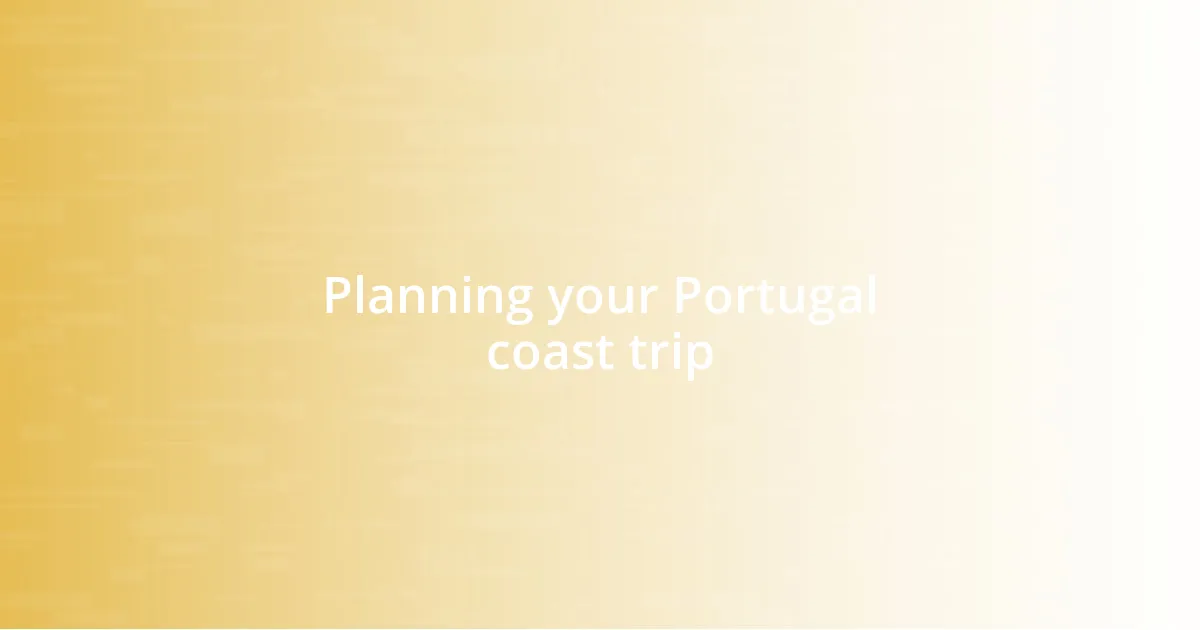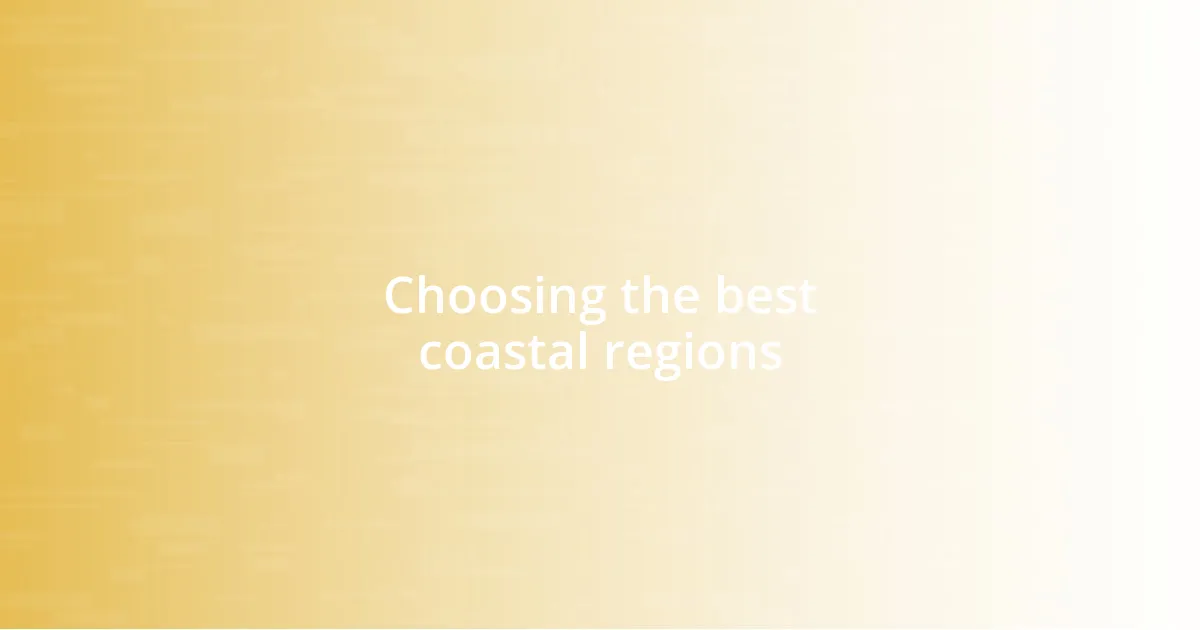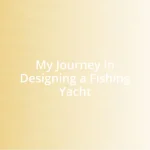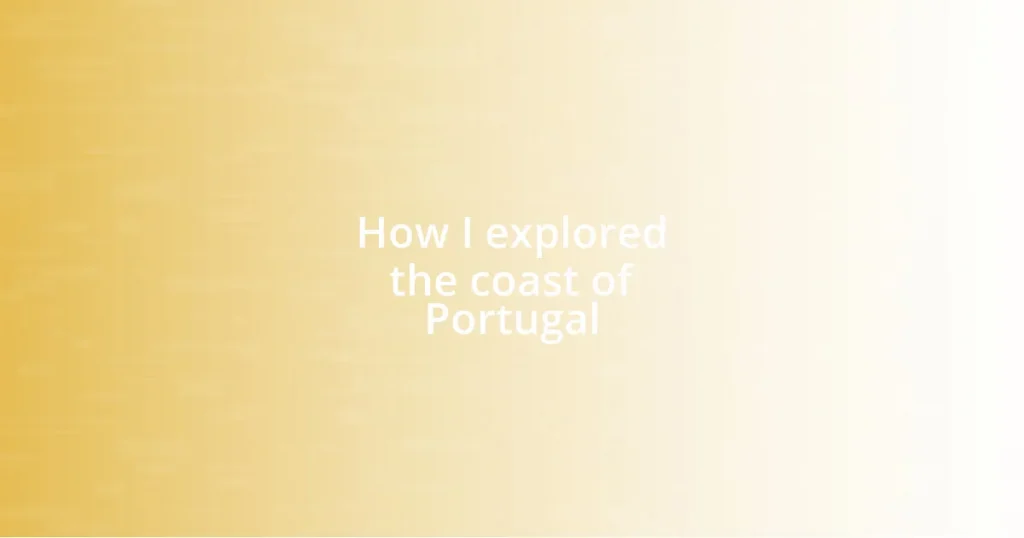Key takeaways:
- Finding a balance between popular attractions, like Lisbon’s Belem Tower, and hidden gems, such as Alentejo’s secluded beaches can enhance your travel experience.
- Each coastal region in Portugal offers unique features: the vibrant nightlife of the Algarve, the tranquility of Alentejo, the lively atmosphere in Cascais, and the laid-back vibe of Ericeira.
- Engaging with local cuisine through family-run eateries and cooking classes can deepen your appreciation for Portuguese culture and create memorable experiences.
- Transportation options include regional trains, car rentals for greater freedom, and biking to connect with the surroundings while exploring the coast.

Planning your Portugal coast trip
When I first considered planning my trip along the stunning coast of Portugal, I was overwhelmed by choices. Should I focus on the vibrant city of Lisbon or explore the charming towns of the Algarve? I remember staring at a map, feeling both excitement and a bit of anxiety. It felt like a puzzle waiting to be solved – where to start and what to prioritize?
One crucial tip I learned was to balance your itinerary between popular spots and hidden gems. For example, while Lisbon’s Belem Tower is a must-see, I found genuine joy in the lesser-known beaches of the Alentejo coast. How about you? Do you prefer the thrill of discovering off-the-beaten-path locations, or do you lean toward iconic attractions? I’ve learned that mixing both can lead to unforgettable experiences.
Don’t forget to factor in local cuisine when planning your trip. The sheer delight of savoring fresh seafood while watching the sunset in a seaside village is something I can’t recommend enough. Remember, this journey isn’t just about the destinations; it’s also about the flavors and feelings you collect along the way. The thought of tasting a delicious bacalhau à brás brought back the warm memories of enjoying dinner with locals, and it’s these moments that truly make a trip special.

Choosing the best coastal regions
When I set out to choose the best coastal regions in Portugal, I was drawn to the idea of contrasting experiences. The Algarve is infamous for its sun-soaked beaches and lively nightlife, which felt almost like a festival for the senses. I remember dancing the night away in Lagos, soaking in the vibrant pulse of the town while the waves crashed nearby. On the flip side, the quieter beauty of the Alentejo coast offered a different kind of magic. Walking along its secluded beaches, the sound of my footsteps mingling with the gentle surf, I felt instantly at peace.
As I continued my exploration, I couldn’t help but find myself captivated by the diversity in coastal towns like Cascais and Ericeira. Cascais was buzzing with life, with its picturesque marina and lively restaurants offering delicious local dishes. I can still taste the grilled sardines from that seaside café, even now. In contrast, Ericeira held a charming, laid-back vibe. Sitting on the cliffs, watching the surfers carve through the waves, I was reminded of the beauty of simplicity. Each locale offers its own unique allure, making it an essential part of the decision-making process.
It’s also essential to consider the natural landscapes that each region boasts. The iconic rock formations along the Algarve coast, with their dramatic cliffs and pristine caves, left me in awe. I took a boat tour that revealed hidden grottos—it truly felt like stepping into another world. Meanwhile, the sweeping sandy expanses of the Alentejo coast embraced me with their quiet serenity. Having experienced both, I truly believe that your choice should align with what resonates most with you: adventure, relaxation, or perhaps a blend of both.
| Region | Features |
|---|---|
| Algarve | Vibrant nightlife, stunning beaches, dramatic cliffs |
| Alentejo | Secluded beaches, tranquility, natural landscapes |
| Cascais | Buzzing marina, local cuisine, lively atmosphere |
| Ericeira | Surf culture, laid-back vibe, scenic cliffs |

Must-see attractions along the coast
I discovered that the coast of Portugal is packed with breathtaking attractions that cater to every traveler’s desires. One stop that truly stood out for me was the stunning Ponta da Piedade in Lagos. As I wandered through the labyrinth of sea caves and rock formations, I remember the moment I first laid eyes on the golden cliffs—each wave crashing against them created a natural masterpiece. I spent hours soaking in the views and talking to fellow travelers, sharing stories and laughter that echoed through those remarkable caves.
Another unforgettable highlight was the charming town of Sintra, just a short drive from the coast. I can still feel the magic of standing in front of the colorful palaces surrounded by lush greenery, almost as if I had walked into a fairy tale. Here are some must-see attractions along the coast:
- Ponta da Piedade: Known for its dramatic cliffs and picturesque grottoes, perfect for kayaking or simply soaking in the views.
- Sintra: A UNESCO World Heritage site with palaces like Pena Palace, providing both history and stunning architecture.
- Ria Formosa: A beautiful natural park teeming with wildlife, ideal for birdwatching and exploring its serene lagoons.
- Caparica’s Beach: A lively beach scene that offers both relaxation and water sports, packed with vibrant beach bars.

Tips for local cuisine experiences
When diving into local cuisine experiences along the Portuguese coast, I recommend asking around for family-run eateries. There’s something special about dining in places that have been passed down through generations. I stumbled upon a small tavern in a hidden alley in Cascais where the owner insisted I try his grandmother’s recipe for caldeirada—a traditional fish stew. It was an explosion of flavors, and I found myself savoring every bite, all while hearing stories about his family fishing in the same waters for decades.
Don’t shy away from trying the street food, either. One evening, as I wandered along the vibrant markets of Lisbon, I discovered warm pastéis de nata being served fresh from the oven. Those creamy custard tarts, with their flaky crust, had me hooked at first bite. It made me wonder, how could something so simple become such a symbol of Portuguese culture? Engaging with local vendors not only enriched my palate but also deepened my appreciation for the craft and history behind each dish.
Lastly, consider taking a cooking class. I joined one in Alentejo that focused on traditional Portuguese dishes. The joyous laughter and shared cooking experience felt like a celebration of community. As we chopped vegetables, I realized that food is not only about taste—it’s about connection, culture, and creativity. This experience made me appreciate Portuguese cuisine on a whole new level, transforming each meal into a story worth sharing.

Navigating transportation options
When it comes to navigating transportation along the coast of Portugal, I found the choices surprisingly diverse and quite convenient. I often took advantage of regional trains that connect coastal towns, which allowed me to enjoy scenic views without the hassle of driving. Each journey felt like a little adventure of its own—sitting by the window with a pastel de nata in hand, I marveled at the changing landscapes from bustling city streets to tranquil beaches.
For those adventurous souls like me, renting a car was an absolute game-changer. With the freedom to explore at my own pace, I managed to reach some hidden gems that aren’t easily accessible through public transport. I vividly recall one sunny afternoon when I drove down a winding road along the Algarve coast, stumbling upon a quaint beach that looked like it was straight out of a postcard. The thrill of discovery made every kilometer worthwhile.
I also discovered how biking can enrich your coastal experience. On a whim, I rented a bicycle in Cascais and pedaled along the boardwalk. The refreshing breeze and the rhythmic sound of the waves became my soothing soundtrack. Have you ever felt so connected to your surroundings? I certainly did, as I waved to fellow cyclists and locals, creating a sense of community in those shared moments. Transport in Portugal isn’t just about getting from point A to point B; it’s about embracing the journey itself.















